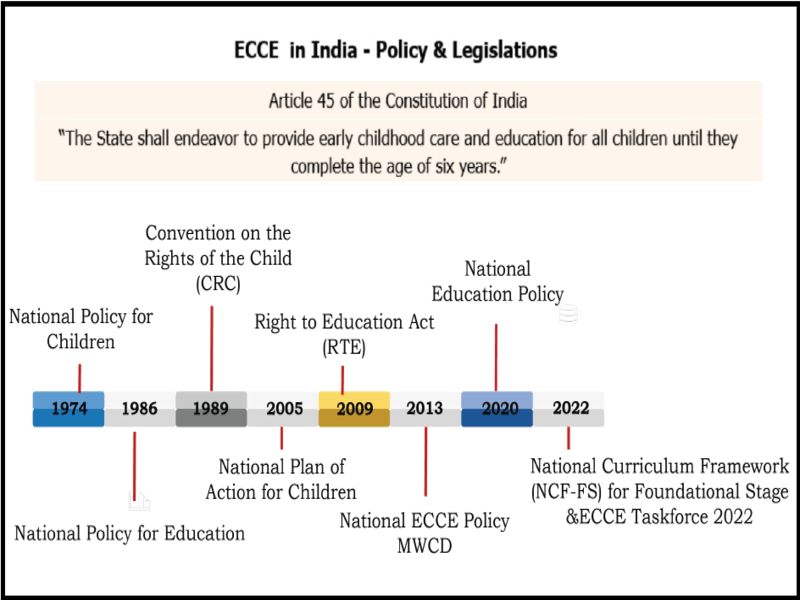
Early Childhood Care and Education (ECCE) in India is a critical component aimed at addressing the developmental needs of children from birth up to the age of six years. Read further to learn more.
ECCE focuses on fostering holistic development which includes physical, cognitive, emotional, social, and language development.
This foundational stage lays the groundwork for lifelong learning and well-being.
Why are early childhood care and education so important?
Early childhood care and education (ECCE), which addresses the period from birth to 8 years old, is important because it capitalizes on a period of rich brain development for children and, when it is of good quality, can help them achieve their full potential.
- It can lay the foundation for good health and nutrition, learning and educational success, social-emotional learning, and economic productivity throughout life.
- Despite the evidence for these social, human and economic developmental gains, it is still often given low priority in education policy and investment and, where it does exist, may exclude marginalized groups.
- ECCE has its extra vulnerability in that much of it is privately provided.
Early Childhood Care and Education (ECCE) in India

- Policy Framework:
- National Policy on Early Childhood Care and Education (2013): This policy was introduced by the Ministry of Women and Child Development to provide a framework that promotes inclusive, equitable, and contextualized opportunities for promoting optimal development and active learning capacity of all children below six years of age.
- Right to Education Act (2009): This act primarily focuses on free and compulsory education for children between 6 to 14 years old but has implications for pre-primary education by advocating for a preparatory year for children aged five.
- Article 45 directs the State to provide ECCE for all children until they complete the age of six years.
- Integrated Child Development Services (ICDS) Scheme: Launched in 1975, the ICDS is one of the largest programs of its kind globally. It provides a package of services including:
- Supplementary nutrition
- Immunization
- Health check-up
- Referral services
- Pre-school non-formal education
Anganwadi Centers, established under ICDS across rural and urban areas, act as primary units delivering these services, with a significant focus on early education and care.
- National Education Policy (NEP) 2020: The NEP 2020 places strong emphasis on ECCE, recognizing its importance in a child’s development and learning trajectory. It proposes:
- Universal provisioning of quality early childhood development, care, and education by 2030.
- Integration of ECCE into the formal schooling system in a phased manner, with a robust curriculum that includes flexible, multilevel, play-based, activity-based, and discovery-based learning.
- Role of Private Sector and NGOs: In addition to government initiatives, numerous private preschools and non-governmental organizations contribute significantly to the ECCE landscape in India. They often provide innovative methodologies and supplement government efforts, particularly in urban areas.
Challenges in ECCE in India
- Access and Quality: Despite extensive coverage, disparities exist in access to quality ECCE, especially for vulnerable groups in rural areas, urban slums, and among different socioeconomic backgrounds.
- Training and Resources: There is a varying quality of training and resources available to ECCE providers, which affects the standard of care and education across regions.
- Infrastructure: Many Anganwadi and pre-primary centres lack adequate infrastructure, which impacts the delivery of ECCE services.
- Coordination: Fragmented administration and the lack of a coherent integration between various departments (health, education, women and child development) often lead to inefficiencies in implementing ECCE programs.
Global ECCE
UNESCO regards ECCE as a fundamental and integral part of the education system and a solid foundation on which to build lifelong education, lives and careers.
- All of its work in this area is aligned with target 4.2 of Sustainable Development Goal 4 which aims to ‘By 2030, ensure that all girls and boys have access to quality early childhood development, care and pre-primary education so that they are ready for primary education.’
- To further advance this target, UNESCO established a new Global Partnership Strategy to bridge the gap and ensure that quality ECCE, early primary school years, and family education, are available for all children.
Why in the news?
National Framework of Early Childhood Stimulation 2024 lays down month-by-month activities to be conducted by parents, Anganwadi staff and ASHA workers for children from birth to the age of three.
- The framework document has been finalised by an internal committee comprising representatives from the Ministry of Women and Child Development, the Ministry of Health and Family Welfare, the Department of School Education and Literacy, the Ministry of Education, the National Council of Educational Research and Training, the Institute of Home Economics, the Delhi University and civil society organisations.
Navchetana – National Framework for Early Childhood Stimulation (ECS)
The framework document aims to fill the conceptual and practical gaps in understanding and implementing care and stimulation from birth until the first three years of a child’s growth.
- Childhood Stimulation: Stimulation activities involve intentional efforts to activate the child’s early development.
- Need of ECS: At this age baby’s brain is twice as active as an adult’s brain and patterns of thinking and responding are established. At birth, only 25% of the eventual brain is formed, while 75% develops in the first 3 years of a child’s life.
Key highlights of the ECS Framework:
- Objective: To empower caregivers and Anganwadi Workers for holistic early stimulation, through responsive caregiving and opportunities for early learning, for optimal development of children.
- The document emphasizes two of the five components of the nurturing care framework: ‘responsive caregiving and ‘creating opportunities for early learning’.
- The nurturing care framework for Early Childhood Development was provided by WHO in 2018.
- Entails 36 sets of activities for children from months 0 to 36 for holistic stimulation of the child’s cognitive socio-emotional, language, physical, and creative development.
Conclusion
The government, along with various stakeholders, is making concerted efforts to overcome these challenges.
The focus is on upgrading the curriculum, improving infrastructure, training the workforce, and better integrating health and nutritional aspects with educational content.
The goal is to ensure a comprehensive approach to early childhood development that can effectively lay the foundation for future learning and the well-being of every child in India.
Continued investments in ECCE are seen as essential for harnessing India’s demographic dividend and promoting sustainable economic growth by contributing to the development of a well-rounded, healthy, and educated future workforce.
Related articles:
-Article by Swathi Satish






Leave a Reply